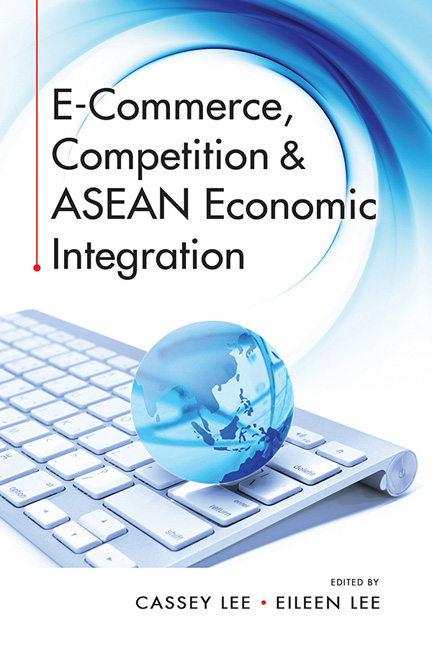Book contents
- Frontmatter
- Contents
- Acknowledgements
- About the Contributors
- 1 Introduction
- PART I
- PART II
- PART III
- PART IV
- 5 E-commerce and its Development in Thailand
- 6 E-commerce Development in Indonesia: Challenges and Prospects
- 7 Development of E-commerce in Malaysia
- 8 E-commerce in Singapore: Current State, Policies and Regulations
- 9 Competition and E-commerce in the Philippines
- 10 Vietnam: E-commerce Market Overview and Trends
- Index
5 - E-commerce and its Development in Thailand
from PART IV
Published online by Cambridge University Press: 31 January 2020
- Frontmatter
- Contents
- Acknowledgements
- About the Contributors
- 1 Introduction
- PART I
- PART II
- PART III
- PART IV
- 5 E-commerce and its Development in Thailand
- 6 E-commerce Development in Indonesia: Challenges and Prospects
- 7 Development of E-commerce in Malaysia
- 8 E-commerce in Singapore: Current State, Policies and Regulations
- 9 Competition and E-commerce in the Philippines
- 10 Vietnam: E-commerce Market Overview and Trends
- Index
Summary
Introduction
Information and communication technology (ICT) development since the late 1990s has enhanced the activities of entrepreneurs and enterprises by improving their access to digital networks. In addition, electronic commerce (e-commerce) has been a major engine in the development of global trade. This has been achieved by enhancing international value chains, market access, internal and market efficiency, and reducing transaction costs (UNCTAD 2015).
However, the use of e-commerce has been mainly restricted to large enterprises in developed countries (UNCTAD 2010). This implies that there might be barriers to e-commerce existing in developing countries, especially for small and medium sized enterprises. According to Kshetri (2007), barriers to e-commerce can be classified into the following: (i) economic barriers which refer to unreliable and costly power supply, inadequate ICT infrastructure and use, limited use of credit cards, lack of purchasing power, and weak financial systems, (ii) sociopolitical barriers which refer to weak legal and regulatory frameworks, cultural preferences for face-to-face interaction and reliance on cash in society, and (iii) cognitive barriers which may involve poor ICT literacy, awareness and knowledge related to e-commerce among both consumers and enterprises.
The objectives of this study are as follows: (1) to provide an overview of Thailand's e-commerce; (2) to discuss factors influencing the scope of e-commerce as suggested by the UNCTAD, such as internet access, payment systems for online purchases, and delivery systems; (3) to provide empirically based policy implications and recommendations in order to enhance the e-commerce performance of Thai entrepreneurs.
In this study, the survey of Thailand's e-commerce conducted by the Electronic Transactions Development Agency (Public Organization) (ETDA) in 2015 is used to investigate the factors influencing the performance of e-commerce enterprises as well as their e-commerce engagement (B2C, B2B, and B2G). This is the first study to examine Thailand's e-commerce using firm-level data from the survey.
An Overview of Thailand's E-commerce
The OECD (2011, p. 72) has defined e-commerce as follows:
The sale or purchase of goods or services, conducted over computer networks by methods specially designed for the purpose of receiving or placing of orders.
- Type
- Chapter
- Information
- E-Commerce, Competition and ASEAN Economic Integration , pp. 63 - 118Publisher: ISEAS–Yusof Ishak InstitutePrint publication year: 2019



